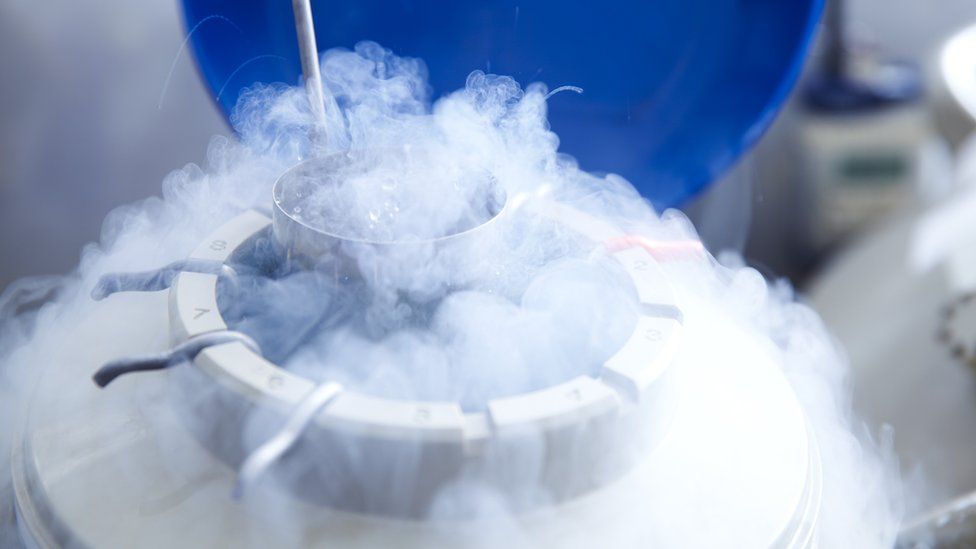
The investigation follows the discovery of a batch of faulty solution used to freeze eggs and embryos
By Aurelia Foster
Health reporter
More than 100 patients who had eggs and embryos frozen at a leading clinic have been told they may have been damaged due to a fault in the freezing process.
The clinic, at Guy’s Hospital in London, said it may have unwittingly used some bottles of a faulty freezing solution in September and October 2022.
But it said it did not know the liquid was defective at the time.
One patient at a second clinic, Jessop Fertility in Sheffield, has also been affected, the BBC has learned.
The fertility industry regulator, the Human Fertilisation and Embryology Authority (HFEA), said it believes the faulty batch was only distributed to those two clinics.
Embryos are routinely frozen after IVF cycles – either to delay treatment for medical reasons or to give couples the option of more treatments in the future.
It is believed that many of the patients affected have subsequently had cancer treatment since having their eggs or embryos frozen, which may have left them infertile. This means they now may not be able to conceive with their own eggs.
Some 136 patients at Guy’s Hospital were only recently told their eggs and embryos may not survive the thawing process if they were frozen with the faulty solution, although the trust received a warning notice a year ago.
Guy’s Hospital’s Assisted Conception Unit is now being investigated by the HFEA, because of a delay in informing people affected.
‘Different decisions’
One patient, who was told their embryos may be damaged, told the BBC: “It’s an incredibly unpleasant process for people to go through, and for those lucky enough to get something in the freezer after all that hard work, this is worrying.”
Another Guy’s patient told her frozen embryos might be damaged said she and her partner “would have made some different decisions, had we known before”.
“I was putting in single embryos. I would have probably put in double,” she said.
“And I would have sought a compensatory IVF. I would have probably done another round of IVF, to bank some more [eggs], because now I’m 43 – I would have been 41 then”.
Sarah Norcross, director of the Progress Educational Trust charity, said it would be “distressing” for those affected.
“If women affected by this incident have undergone medical treatment which has compromised their fertility, then their opportunity to have a biologically related child may have been lost.
“If women affected by this incident had sought to extend their reproductive choices by freezing their eggs, then they too may have lost their best opportunity to have a family, if the quality of their eggs has declined during the period that has elapsed.”
Image source, Getty Images
About 100,000 treatment and storage cycles took place in the UK in 2022/23, the HFEA said
Guy’s Hospital has apologised to those affected, and said the delay was partly because of “uncertainty from the manufacturer about which batches were affected”.
The BBC contacted the manufacturer of the solution, Cooper Surgical, and was told the company had “no comment” to make.
In February 2023, the US firm issued an urgent safety notice about the liquid, saying that one “lot” of the product “may contain mislabelled vials” which “may impact the viability” of the eggs or embryos. It said the batch had been sent to both Guy’s Hospital and Jessop Fertility, which is run by Sheffield Teaching Hospitals NHS Foundation Trust.
HFEA has described the investigation at Guy’s Hospital ACU as “ongoing”, adding that it would take “any further action required”.
A spokesperson for Guy’s and St Thomas’s NHS Foundation Trust said: “While we did not know about the potential issue at the time eggs or embryos were frozen, this manufacturing issue may adversely impact the chance of frozen egg or embryo survival during thawing.”
The Medicines and Healthcare products Regulatory Agency has been approached for comment.
What should fertility patients do?
Both clinics have said all patients potentially affected have been contacted already.
The HFEA said patients at other clinics should not be concerned regarding this problem and it hoped this provided “reassurance to anyone concerned”. However, anyone who is worried by this incident should contact their clinic.
Fertility treatment in the UK is generally very safe, the HFEA said.
According to recent HFEA data, of the almost 100,000 treatment and storage cycles which took place in 2022/23, more than 99% were conducted without incident.
Are you affected by the issues raised in this story? Share your experiences by emailing haveyoursay@bbc.co.uk.
Please include a contact number if you are willing to speak to a BBC journalist. You can also get in touch in the following ways:
If you are reading this page and can’t see the form you will need to visit the mobile version of the BBC website to submit your question or comment or you can email us at HaveYourSay@bbc.co.uk. Please include your name, age and location with any submission.
Related Topics
Related Internet Links
The BBC is not responsible for the content of external sites.








